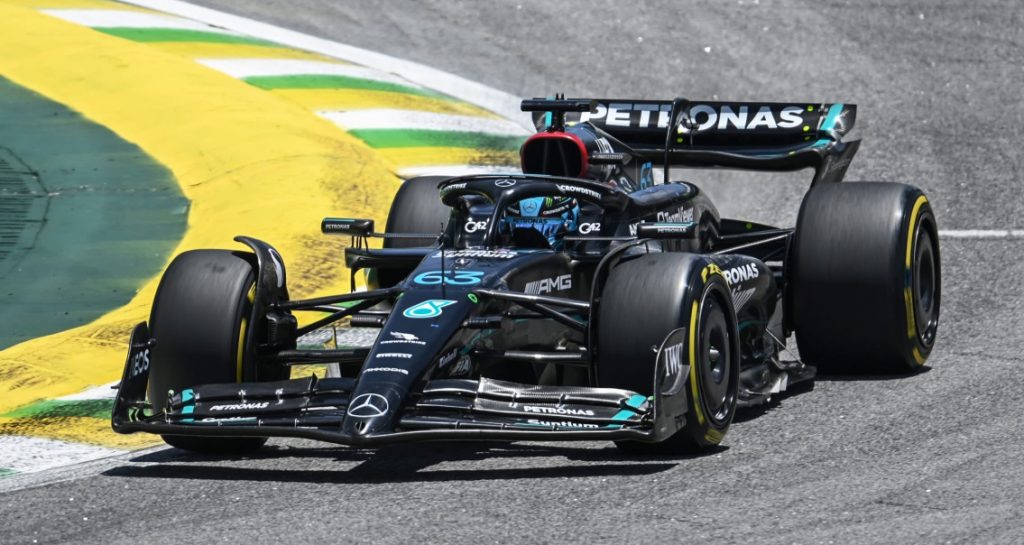Mercedes F1’s Mounting Challenges at the Brazilian Grand Prix
Giancarlo Perlas November 4, 2023Interlagos, nestled in Sao Paulo, Brazil, is no stranger to Formula One drama. The Brazilian Grand Prix circuit has birthed countless nail-biting title deciders and celebrated extraordinary comebacks; most notably Lewis Hamilton’s riveting victory in 2022 for Mercedes F1 following two grid penalties that left fans reeling with delight and the bittersweet final career race of Michael Schumacher.

However, Interlagos isn’t an easy win for any team because it poses difficult setups that need careful maneuvering based on the assessment of Mercedes-AMG Petronas. The first and third sectors demand low drag to accommodate lengthy straights while the windy middle sector demands high downforce. The conditions create a tantalizing conundrum for Mercedes F1’s strategists who must find effective solutions amid all intricacies.
Record Breakers on Unfamiliar Terrain
Interestingly enough, former Mercedes F1 driver Valtteri Bottas holds the current Brazil Grand Prix lap record of 1m10.540 achieved back in 2018. This was the same year when Hamilton logged another impressive feat by setting up absolute track record timing with his pole-taking drive registered at just over one minute seven seconds flat.
But history alone won’t be able to dictate this tumultuous course. The Brazilian Grand Prix poses a diverse array of challenges that Mercedes will have to overcome, from scorching track temperatures that can reach 60 degrees Celsius making tire management critical to the high altitude and unique banked turns tending towards lockups.
Navigating Challenges Ahead
At 4.309 km long, The Autódromo José Carlos Pace may be one of the shortest circuits in F1’s calendar but its changeable conditions ensure an unpredictable race every time round. One moment you’d find sunshine beautifully illuminating the tracks leading on to a torrid thunderstorm changing dynamics entirely—a scenario not uncommon given São Paulo’s volatile weather.
Mercedes Team Principal Toto Wolff acknowledges this challenge as he pledges prudence going into the final leg of their triple-header saying his team aims for a solid baseline with the hope it outperforms all complexities present at Interlagos; contributing yet another memorable race day experience both for fans & occupiers behind wheels alike.
Holding On With Stakes High
This circuit might hold fond memories of where Lewis formed an unbreakable bond with fans—primarily the nostalgia steered by Ayrton Senna’s birth city—but there isn’t any room left for sentiment when competing under intense pressure which comes naturally with a race of this stature. All that matters is performance against impending challenges such as the hard-to-navigate uphill grid, the 40-meter drop in elevation from start to finish, and combined corner entries. All these necessitate top-notch vehicle control by Mercedes F1 drivers.
The Uphill Battle
Mercedes F1 has long been synonymous with celebratory moments at the Brazilian Grand Prix. The place witnessed George Russell’s first victory marking him as an emerging star within the Mercedes F1 family and leaving Brazil each time on a high note bustling vividly in a carnival mood adding another feather to their hat.
End Notes
There’s no doubt Mercedes F1 will face formidable hurdles ahead. How well they adjust at the Brazilian Grand Prix could spell the difference between yet another unforgettable spectacle or potential pitfalls leading toward uncertainty—inevitably shaping what lies for them in future F1 seasons.
For now, all eyes stay locked onto Interlagos and we’ve just a few days left before witnessing gritty brilliance unfold!




